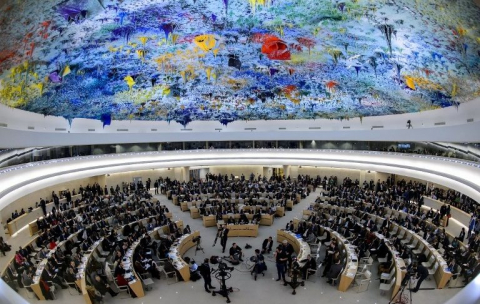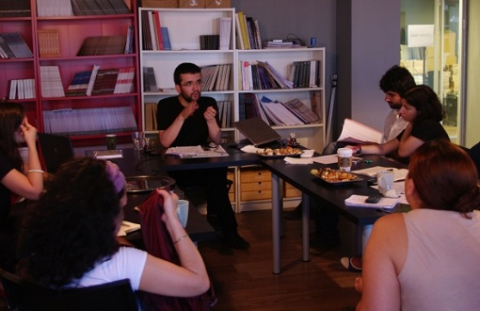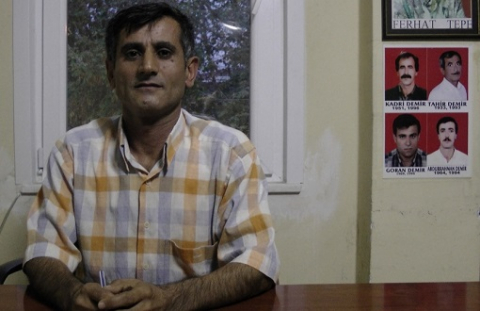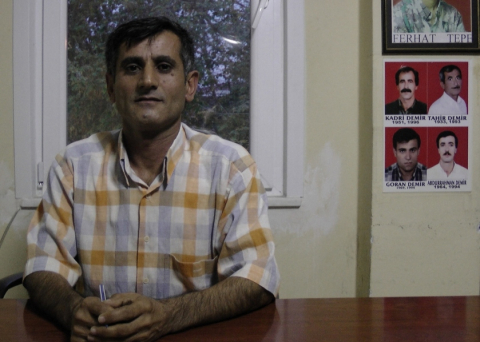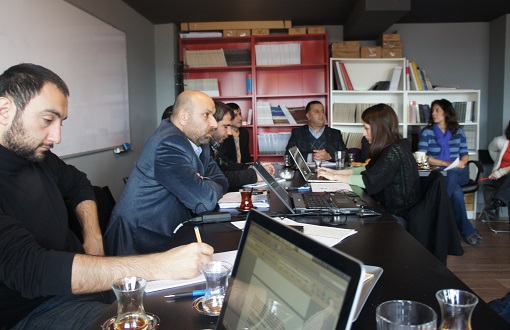
Human Rights Association’s documentation work
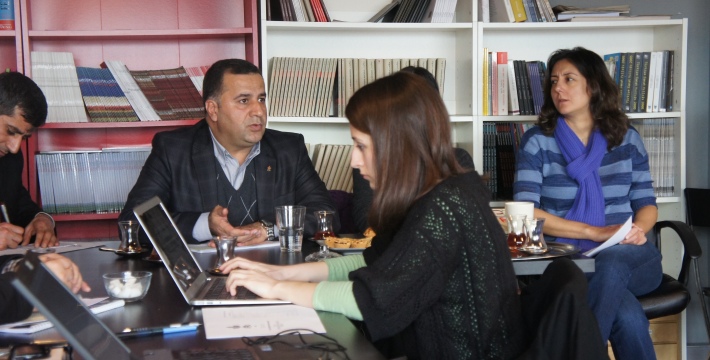
On March 3, Raci Bilici of the Human Rights Association’s (İHD) Diyarbakır Branch made a presentation on documentation initiatives in Diyarbakır as part of our Civil Society Initiative for Truth Commissions.
Representatives from İHD, the Memory Center, Legal Aid Office for Sexual Harassment and Rape Under Custody, Dut Ağacı Collective, Göç-Der (Migrants Solidarity Association), TİHV (Human Rights Foundation of Turkey), TESEV (The Turkish Economic and Social Studies Foundation), YAKAYDER (Association for Solidarity and Support of Relatives of Disappeared People), Mazlumder (The Association Of Human Rights And Solidarity For Oppressed People) İstanbul Office, Olof Palme Center and Muğla Truth and Justice Initiative participated at the meeting, which was held at Anadolu Kültür. Significant aspects of the documentation efforts, such as the violations documented by İHD Diyarbakır Branch Office, complaint registration procedures, prosecution, reporting, technical issues, and data storage were discussed during the meeting.
The meeting started with a presentation by Meltem Aslan from Hafıza Merkezi. Talking about various meetings with different civil society organizations over the course of the Center’s foundation, Aslan underscored that the meetings revealed once again the significance of documentation. In this context, she conveyed that documentation will be an important component of their work and they will focus on enforced disappearances as a pilot project.
Following Aslan, Bilici from İHD Diyarbakır discussed the operations of the association and in particular the work of its documentation unit. The data, which has been obtained from 13 branch offices and 4 representative offices since 1988, have accumulated in an extensive archive at İHD Diyarbakır Office. The 2011 İHD regional report included 29,366 rights violations recorded in the archive documents.
How are the violations documented
Since its foundation in 1988, İHD has been documenting as many rights violations as possible. Even though İHD works on second and third generation rights, it mainly documents violations of first generation rights.
These efforts culminate in reports that are shared with the public. [1]In addition to annual reports, İHD Diyarbakır Office publishes quarterly (or sometimes biannual) regional reports. Violations are detailed under separate headings. For instance unsolved murders are documented under subcategories of women, men and children, and violations of women’s right to life under suicide, rape, forced prostitution, and harassment by security forces.
When the need arises, İHD also publishes special reports focusing on particular issues. These have included reports on rights of the child, prisons, mass graves or the Roboski massacre. [2]
Extensive statistics on human rights between 1988 and 2011 have been compiled as a result of the association’s efforts. Incidentally, most of the data in the reports comes from the Diyarbakır Branch. The appeals to the Branch Office have contributed extensively to the documentation efforts. The appeals are made through a form or interviews.
Bilici also mentioned that it is very important to verify the source so as not to jeopardize the credibility of the report. Therefore, the association frequently undertakes fieldwork and in-depth research, and news from the press are only reported after verification.
Bilici notes that people’s fears can obstruct the documentation of rights violations, and he estimates that they are able to document only 40% of the violations. Especially in the past, the fact that people were afraid to approach the association prevented them from learning about many violations. Another additional obstacle arises when police or military forces preventing them from entering the incident sites; many places are forbidden for security reasons.
Working with bar associations has helped overcome this impediment. Thus, when they went to investigate the Uludere massacre, together with the chair of the bar association, they were allowed to enter places they could not access on their own.
The operations of İHD Diyarbakır
The Branch Office has about twenty program managers. Of the twenty, seven or eight are lawyers. Other managers have different professions, but they ensure that they have sociologists and lawyers among them. The number of women staff is quite high and none of the managers have organic ties to any political parties.
The Branch Office has 850 members, of which 200-250 are active; it also has commissions working in the fields of law, prisons, women, children, combatting torture, environmental and urban rights, relations with civil society. Active members work in these commissions.
Legal aid
İHD Diyarbakır also provides legal support to victims and their families. For some of the cases registered at the office, power of attorney is taken from the family, and the case is litigated on behalf of the family until it is closed. Support is also provided to families for drafting and filing petitions. Additionally, there is ongoing daily correspondence with the Ministry of Interior on issues such as sick prisoners, solitary confinement, and bans on speaking Kurdish in prisons. When a statute of limitation approaches, if necessary, support is solicited from bar associations and lawyers of other organizations.
Bilici, who stated that the ECHR constantly convicts the state, noted that even though the perpetrators do not get punished as a result of this, at least the state is exposed and state violations are rendered visible to the public.
Sharing the archives
Bilici related that they share 90% of the documents they have in their archives; however, the complete archives are not currently open to the public. Here, security concerns are also a factor. The archive is not shared online due to the threat of a possible cyber-attack. For example, the map of mass graves they published online was attacked repeatedly.
Even though the participants agreed that it is important to share the archive, it is possible to see that the mutual lack of trust is an obstacle before this. In response to one of the questions, Bilici says that considerable efforts they undertake in the field are disregarded by certain civil society organizations and that such attitudes hamper mutual trust.
